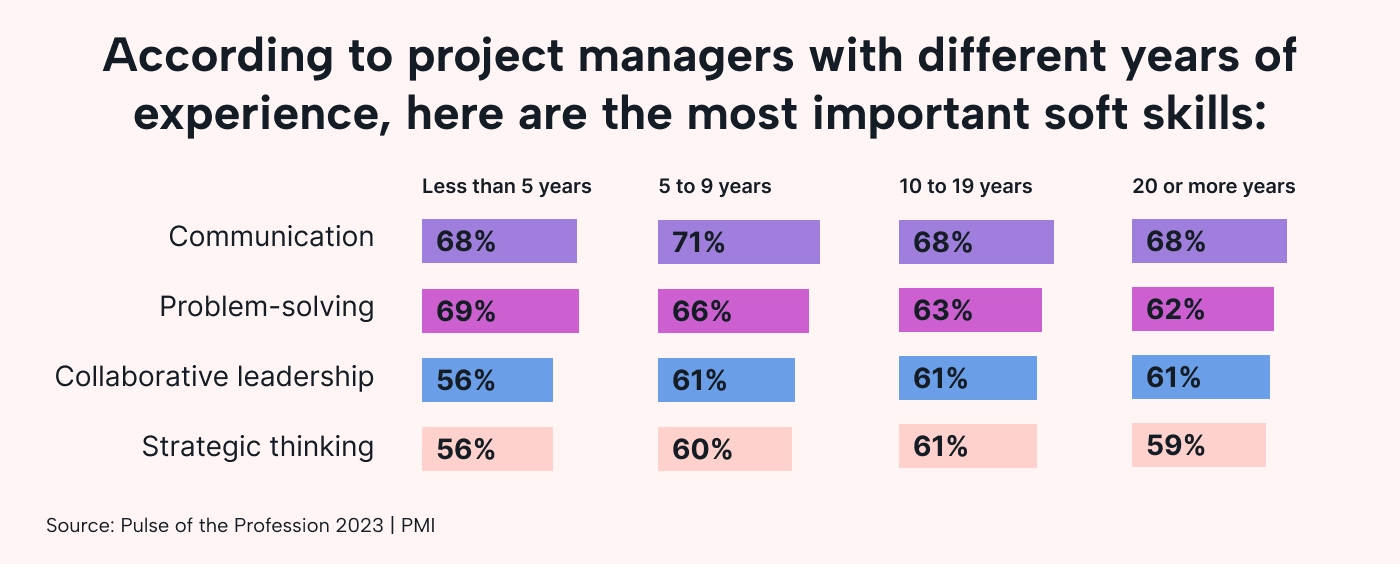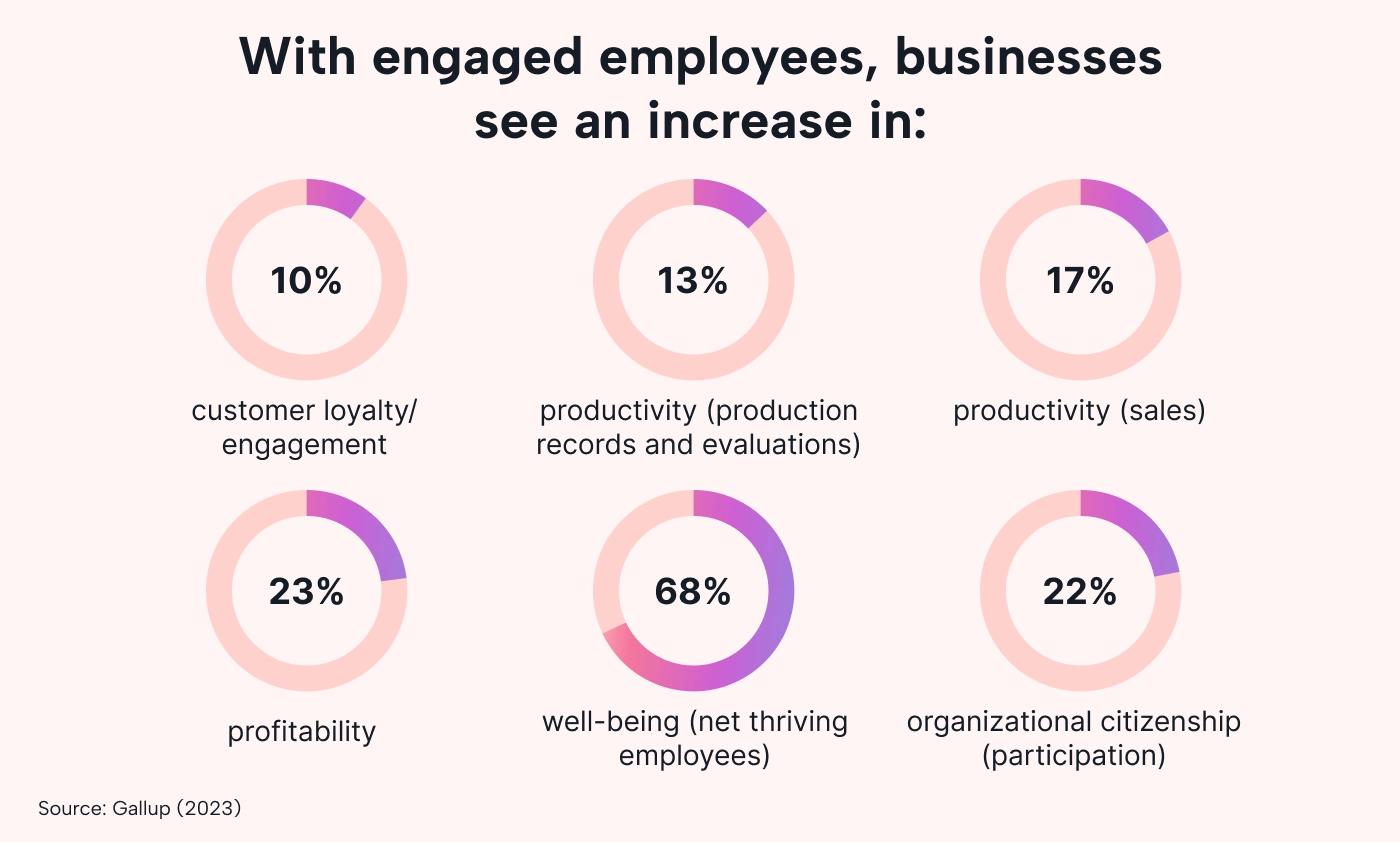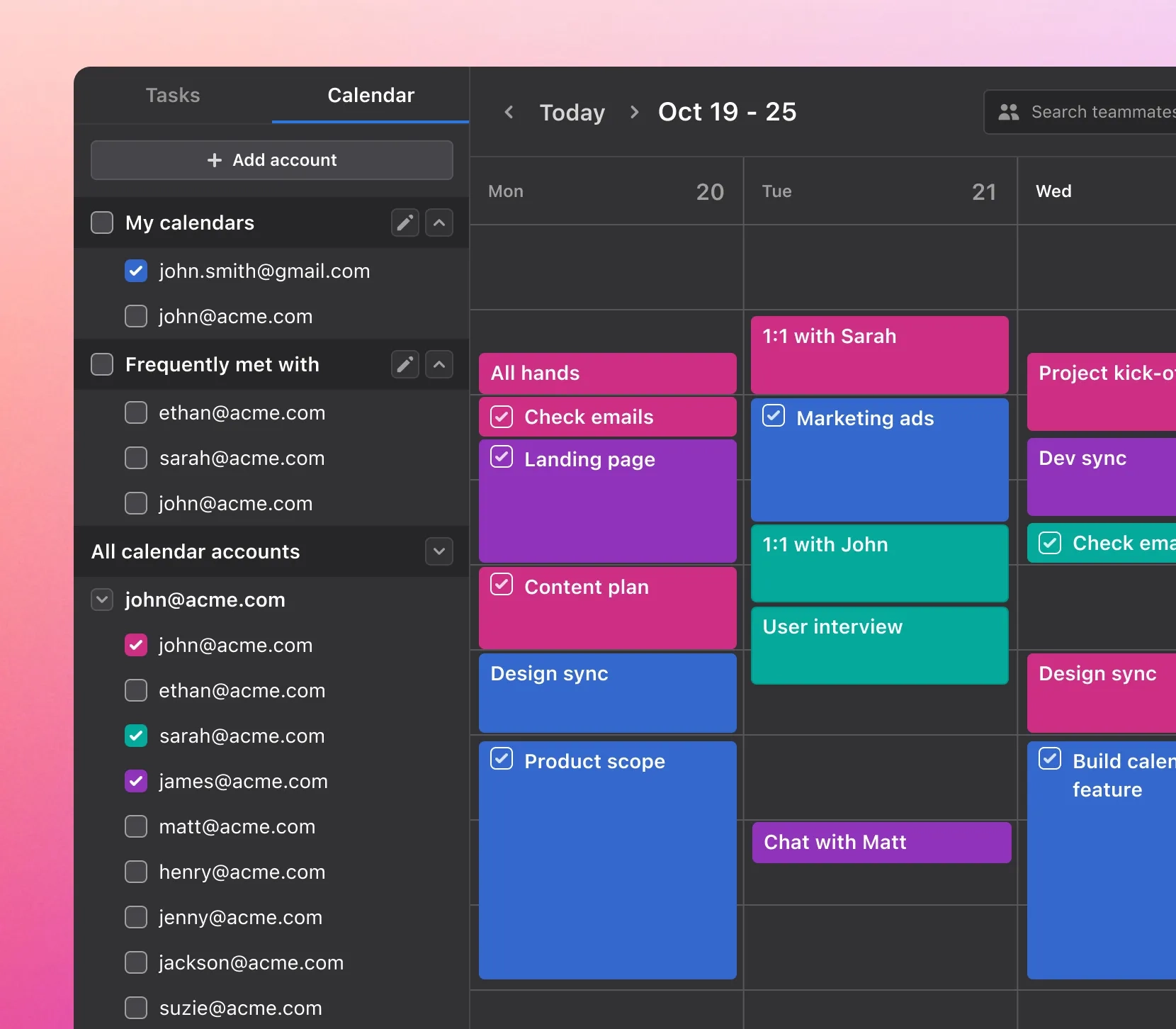There’s a huge difference between how people perform when they feel they’re working under a good manager and the type of active or passive sabotage (quiet quitting) that can happen under bad ones. In 2023, 23% of employees were actively disengaged, costing the global economy $8.8 trillion in lost productivity.
If you’re looking to improve your management skills and foster healthy and productive relationships with your employees, read on. In this guide, we explore what makes a good manager and share concrete action steps you can take to improve in each area.
7 soft skills every manager needs to lead and inspire their team
A 2023 report by PMI highlights the most important soft skills for project managers.

They call the following four specific ones “power skills” — those that amplify the impact of your technical expertise and experience as a manager:
- Effective communication
- Problem-solving skills
- Collaborative leadership
- Strategic thinking
While these are crucial, we think a few more soft skills should have made the cut, including empathy, the ability to prioritize, and flexibility.
Let’s discuss each of these seven skills in detail.
1. Effective communication based on active listening
In the PMI report mentioned above, experienced managers were more likely to rate effective communication as a crucial soft skill than anything else — and with good reason. To be a good manager, you need to master the art of listening and communication.
How to improve your communication skills:
- Ask open-ended questions that get your employees to participate in the planning process.
- Write down and clarify your key ideas and goals before speaking about them.
- Hold 1-on-1 meetings with employees in addition to standups and other team meetings.
- Routinely ask for feedback.
2. Problem-solving skills
As a manager, you need to take the lead on solving problems. One of your key responsibilities is to ensure no problems block your employees from doing their job.
A supplier suddenly can’t deliver a necessary part? You need to be comfortable leading the process of finding alternate suppliers to deliver the finished product on time.
Is a process step causing frustration with some of your team? You need to jump in and recognize what’s causing the friction, whether it’s lack of clarity, lack of training, or something else, and develop a solution that works for everyone.
If you’re not comfortable solving problems under pressure, you won’t be able to lead a team on challenging projects.
How to improve your problem-solving skills:
- Read case studies and books that cover how people overcame challenges in your industry (or a related one).
- Actively seek out issues as a team and work on improving them.
- Use root cause analysis to get better at determining what really creates problems.
3. Collaborative leadership
Ralph Nader summed up this soft skill well when he said: “I start with the premise that the function of leadership is to produce more leaders, not more followers.”
Collaborative leadership happens when you help employees feel like they’re a crucial part of the whole — that they’re working with you, not under you.
Being collaborative makes a massive difference. Employees feel more engaged when they’re directly involved. And organizations with engaged employees are more productive, profitable, and preferred by customers.

You can also look at this as the difference between micromanagement and macromanagement. Your job is to lead and assign responsibilities that help your employees flourish, not to walk each employee through their job manually.
How to improve your leadership skills:
- Understand your organization’s levels of managers and where you fit in the hierarchy.
- Set team goals collaboratively with your employees.
- Give your employees more responsibilities and empower them to solve low-level problems on their own.
- Help employees achieve their career goals.
4. Strategic thinking
If you’re not right about the big picture, you’ll end up guiding your team in the wrong direction. It doesn’t matter how good you are at motivating people if your goals aren’t helpful for your business.
That’s what makes strategic thinking important.
How to improve your ability to think strategically:
- Read books on strategy, from Sun Tzu’s The Art of War to Your Next Five Moves.
- Check out case studies of specific strategies successful companies have used to outmaneuver their competition.
5. Empathy
A lot of managers today practice active listening to establish better relationships with employees.
However, if people don’t feel like you support them and are only acting out a role, active listening won’t get you very far. You need to earn their trust with empathy and genuinely care about where they’re coming from.
How to boost your empathy and emotional intelligence:
- Always try your best to look at each circumstance from the other person’s point of view.
- Ask your employees about their life situation, not just their projects and professional goals.
- Offer the benefit of the doubt in most cases.
6. Ability to focus on the right things
If you want to alienate your workers, a great way to do this is to focus on tertiary things, like a clean desk policy.
A good leader focuses on deliverables, deadlines, and how team members communicate with you and their teammates. So, keep your priorities straight.
How to focus on the right metrics and help motivate your employees:
- Stay focused on the bottom line. For salespeople, that could be closed deals.
- Avoid metrics that align with a micromanagement approach.
- Communicate clearly with your employees. Inform them which metrics they’re expected to improve on, and actively monitor their performance.
7. Flexibility
As your team and the competitive landscape in your industry change, you have to be able to make adjustments to thrive. Flexibility is vital for being a good manager because it allows you and your team to make necessary changes and keep moving forward.
How to incorporate more flexibility into your management:
- Explore different management styles.
- Learn more about the Agile methodology and adopt aspects of it in your management approach.
Good managers take responsibility for their own training
Eighty-two percent of managers are “accidental managers” — people who were promoted to a managerial role without formal training. So, chances are high that if you’re reading this, you fall into that category.

But that doesn’t mean you have to stay unqualified. Successful managers take responsibility for their training.
You don’t have to join an MBA program. But you should ask for feedback from your team, analyze your own performance, and work on improving the areas you might be lacking in.
Here are a few things that good managers do to get better:
They read books on communication and leadership
Reading books on leadership is a great way to pick the brains of world-renowned leaders and managers — without breaking the bank.
Here are a few examples of books to get you started as a first-time manager:
- The 21 Irrefutable Laws of Leadership
- High Output Management
- The Toyota Way
- Crucial Conversations: Tools for Talking When the Stakes Are High
They proactively ask their company to send them to seminars and conferences
Attending seminars and conferences is a good way to indicate to your superiors that you’re invested in your own growth.
Consider the following examples:
- SHRM Annual Conference
- World Business Forum
- eWN ICON (for women)
- Local events and seminars
They ask for — and graciously accept — feedback from their team
Effective leaders listen to their team. But to be able to listen, you must first ask for feedback. Give your employees the opportunity to give you their honest opinions about your management style.

Ask questions like:
- What do you think of the way we do things at (Company Name)?
- Are there any bottlenecks that get in the way of doing your job?
- Is there anything I can do to make your job easier?
Because many people don’t like giving negative feedback directly, it may help to create an anonymous survey. Note that this shouldn’t replace individual conversations. It should supplement them.
They analyze the team’s performance and take responsibility for it
Analyze how your team is performing at a macro level. Don’t just think in terms of milestones met, but also how quickly you’re progressing toward the next goal and the general team morale.
The next step is to take responsibility for any ongoing issues and give the proper credit for your team’s successes.
As a manager, you set the tone for the company culture. By taking responsibility, you establish a powerful precedent for the rest of the team.
They seek advice from more experienced leaders in the organization
Mentorship is one of the best ways to grow as a manager. Seek out senior managers in your organization, especially those who excel in areas you struggle in, and ask for their help.
If your technical skills aren’t as solid as they could be, you may already have the expertise you need in your team. That’s why, in many Agile teams, project managers make sure to include technical experts in the planning process.
The systems and tools that make good management possible
“I just deal with things as they come” is many poor managers’ motto. If you’re constantly running around putting out fires or having to micromanage new hires, you’re not going to be able to function as an effective manager for your whole team.
Instead, implement systems that make your job as easy as possible. Consider the following:
An effective onboarding system and standard operating procedures
To avoid having to personally coach each new hire, a good onboarding system is a must. Here’s an example of what this looks like:
- Adopting a learning management system with training videos or in-software tutorials
- Creating standard operating procedures (SOPs) and other documentation
- Automatically assigning new hires a mentor from their team (in a relevant position)
This will help with new employee engagement and allow people to start delivering value and feeling like part of the team faster.
Smart task management tools
You don’t want to rely on email, Slack, and meetings to stay on top of your team’s work. Instead, it’s more efficient to use a task management platform that gives you full visibility of your team’s productivity.

Goal or strategy tracking system
You need to track your progress toward long and short-term goals reliably. One idea is to use a system with objectives and key results (OKR) and track the resulting metrics in dedicated software.
Smaller teams with more short-term goals can do this in a spreadsheet.
Communication protocols
Your employees need to know how to reach out to you in different scenarios, such as urgent versus. non-urgent ones. The best way to control this is to set up different channels and clearly describe when to use each.
One key to becoming a confident manager is to trust that your team will reach out to you when you’re needed. Systemization will do just that.
Make your job as a manager easier with Motion
If you want to become a more efficient manager, you need visibility into the process and time to work on high-impact tasks. This is the foundation for everything else.
With Motion, you get full visibility over how your employees are progressing on tasks and the ability to automatically delegate tasks to those with suitable skills and availability.
Together, this helps you speed up your daily to-dos and low-level tasks, giving you more time and energy to focus on empowering your team, improving your onboarding system, and preparing for the future.
Try Motion for free to see just how much more smoothly you can manage your team.

Ragnar is a Pomodoro enthusiast and a SaaS writer with over 10 years of experience. When he's not focused on getting a sentence just right, he loves cooking and training Muay Thai.




